In this first class diary interview series, I spoke with a triple first-class lawyer with ceaseless passion in commercial law practice. Onoriode Reginald Aziza is a clear example of focus, discipline, self-belief and drive for result. The only reason Onoriode went the noble profession route was to rebel against his father’s decision to make him study Medicine and today he has every reason to celebrate his decision; presently a doctoral student of Law at the University of Oxford and three first class degrees in law in his academic udder already.
In his own words;
I decided to study law simply because I wanted the decision of my future career to appear like it came from me. The rest, they say, is history.
Read his interesting story for yourself and be motivated to go after your goal(s) because its possible.
Elvis Boniface of Edugist: Could you please give a brief description about yourself
Onoriode Reginald Aziza: I am Onoriode Reginald Aziza. I am from Delta State, and the last child of a retired civil servant father, and a university professor mother. I graduated from the Faculty of Law, Obafemi Awolowo University, Ile-Ife, in 2012, and thereafter finished from the Nigerian Law School, Yenagoa in 2013. I completed my Youth Service program and then took the specialised Masters of Corporate Law program in the University of Cambridge. In each of these programs, I was fortunate to graduate with First Class Honours. Thereafter, I was worked in leading law firms in Lagos, London and Paris. I am currently studying for a PhD in capital markets law in the University of Oxford.
EB: Were there any motivating factors that triggered your choosing your course of study?
ORA: Not quite. In fact, my decision to study law was taken to rebel against my father who wanted me to study medicine. I was fortunate to be a well-rounded student in my secondary school days in Kings College Lagos. Transitioning into the SS classes, my Dad had thought (which, I in fact agreed with) that I study medicine. At the time, fired up with stories of Dr. Ben Carson, I had wanted to be a neurosurgeon. However, I got defensive when my Dad tried picking the subjects I would take in my SS classes. Indeed, left to my own devices, I would have picked the same subjects he tried selecting for me. But in a feat of naïve stubbornness, I decided to study law simply because I wanted the decision of my future career to appear like it came from me. The rest, they say, is history.
EB: As a first-class graduate, there were surely some moments you likely experienced some setback in your performance. Could you still remember any of those moments?
ORA: I could bore you with several! But maybe two instances highlight the problem. In my time in OAU, I had As turn into Cs simply on the whims of the examiner. I don’t think it is entirely unfair to say that SOME lecturers fail to realise that the examination scripts they grade is a piece of the student’s destiny in their hands.
On one occasion in my first year, I wrote a Literature-in-English test. At the conclusion of the test, the examiner asked students to pass their script to the aisle where he would pass by to pick them. I duly did. A lady seating further down the row was still writing and so she did not send our scripts down. The lecturer passed our row without collecting our scripts. We begged him (and the lady whose fault it was owned up to the mistake). After a lot of entreaties, he asked us to drop our scripts in a particular drawer in his office, which we did. About a year later, the results were released and although I was the best student in the examination, I still made a C. The breakdown suggested I had scored about 14 out of 40 in my C.A. I immediately detected a problem and went to the lecturer’s office to complain. He asked me to go to that very drawer and check if my script was there. The scripts were untouched!
I don’t think it is entirely unfair to say that SOME lecturers fail to realise that the examination scripts they grade is a piece of the student’s destiny in their hands.
In another instance, I had inexplicably scored higher in my C.A. (over 40), than I did in my examination (over 60). I complained to the lecturer pointing out that that was the 7th examination I was taking in the Philosophy department and I had scored As in all 6 previous subjects, with 3 of those instances, scoring over 90%. It was simply inconceivable I will score below half mark in an examination. For a department that prides itself in rational reasoning, the lecturer’s response was disconcertingly puerile. According to him, he had made a 2:2 in the university and there was no reason I would not get to my eventual destination even if I did not achieve a first class.
I still hold these things against the lecturers, not because I failed to achieve my eventual goals, but because this is the very mentality that would have dashed the goals of others. I have no reason to validate it.
EB: There are two major skills that every student must possess: COMPETENCE and PERFORMANCE. While competence revolves around skill acquisition, performance is much more concerned about skills application. It is believed that most graduates are competent because their academic performance testifies to this, but they are performance-challenged. This poor performance ipso facto hinders them from getting lucrative jobs in the labour market. Do you agree with this assertion?
ORA: I don’t think I fully agree with the assertion for a number of reasons. I think there is a tinge in the assertion that tends to validate a dated distinction between being ‘book smart’ and being a ‘good performer’. The debate is sometimes phrased as a distinction between being ‘intelligent’ and being ‘brilliant’, one having the skill and the other knowing how to apply it. I have always struggled with these debates because, first, they sometimes fail to realise that skills acquisition (what you call competence) is valuable in and of itself and second, a person cannot apply skills that he/she simply has not acquired! In legal jargon, we would say a person cannot give what he does not have. To preface, I do agree that institutions can do a bit more to make their teaching and instruction more practical, a topic I will come to shortly.
In the first place, we need to understand the structure of society. We unfortunately have placed a lot more premium on some jobs than on others. This premium is reflected in the remuneration structure the society adopts. Consider a first-class lawyer for example. He knows he is perhaps better suited for life in the academia. However, even upon becoming a professor, he will earn peanuts. He will hardly become an SAN or a Justice of the Supreme Court (since they are promoted from the Court of Appeal and cannot make a transition directly from academia). After he has taught the person who goes on to become an SAN, at a public function, the SAN is treated much better and people pander to his whim, whilst the professor is left in the shadow of his student. With these in mind, when making a career decision right after he has been awarded his first-class degree, it is rational for the student to dive into law practice. But in this field, he is a round peg in a square hole; he cannot put in the long hours required; and perhaps, given the high standard to which he holds himself, needs a bit of time to think arguments through rather than mumbling an argument off his feet before a judge. Societal pressure, not poor education or lack of diligence is his problem here. You cannot judge a cheetah by its ability to swim; or a shark by its ability to sprint. If society has adequate structures to incentivise people to pursue fields they are best suited for, I do not think this would be as serious a problem as it is said to be.

Regarding the practical nature of teaching, I do agree we can do a bit more here as a society. But this raises up serious questions: what is the proper function of university education? How much foresight is required of educators (and indeed students) at the time of formal education? How much skills application would an engineer have needed to work with Elon Musk in producing a re-useable outer space craft? Was it better then to acquire the advanced learning, particularly since that learning had never been applied before? Again, it is impossible to apply a skill a person has not acquired. Thus, acquisition is key, and skills once acquired, can, in a properly supportive environment, be applied in such a way as to produce welfare-enhancing outcomes for society.
EB: What do you think are responsible for competence without performance and could you suggest ways of improving the performance level of university students and graduates?
ORA: Laughs. I suspect this answer prejudged that I would agree with the previous assertion. Since I have disagreed with it, I answer only to the extent that I said I agree we can better support practical teaching during formal education. It is absolutely correct to say that a pharmacist who throughout studies never performed an experiment in the lab, a lawyer who throughout studies never saw a court room or a doctor who throughout studies never saw a patient, cannot fully claim adequate backing for their titles. An amount of practical education is therefore crucial.
Beyond this, however, students must individually take responsibility for the application of the skills they need in their respective careers. It is worth emphasising that these skills are sometimes firm-specific and simply cannot be taught in formal education. Beyond this, as a society, we need to properly incentivise graduates to choose and pursue their careers rather than funnelling them into silos. Not every student of accountancy needs to work in KPMG or Ernst & Young. If not, who would set the auditing standards in the first place?
You cannot judge a cheetah by its ability to swim; or a shark by its ability to sprint. If society has adequate structures to incentivise people to pursue fields they are best suited for, I do not think this would be as serious a problem as it is said to be.
EB: Achievement in life transcends one’s personal efforts. There were people who, during your programme, rendered some assistance that made your dreams a reality. Who are specific persons whose contribution you can’t forget in your first class feat?
ORA: There are a number of people asides my family, to be honest. In my undergraduate days, Professor S.B. Odunsi definitely provided an incredible amount of support to me. At the Nigerian Law School, I was privileged to be personally mentored by the Late Miss F. Eimunjeze (may God rest her soul) and Mr. Arthur Elvis Chukwu – a fantastic, fantastic man. I am yet to meet a teacher more committed to the success of his students.
EB: As a first-class graduate, are you currently gainfully employed?
ORA: As I mentioned earlier, I am currently studying for my doctorate full-time in Oxford. Prior to that, I had been gainfully employed in three countries within a few years of my graduation.
EB: Do you think your grade have or is giving you any major advantage over other graduates will lesser grade?
ORA: I think it would be dishonest of me to say it is not. The truth is that if you put out three first class degrees and both Oxford and Cambridge on your resumé, you will get people interested, at the minimum, to have a chat. So, I will say it has given some me advantages. Of course, that is not to say I rest on my oars. At the level I have to compete, I am usually up against people with equally (and perhaps more) impressive profiles, which means I still have to be at my very best. In addition, nothing in what I have said means that people who have not been so fortunate do not have opportunities at the very top. Diligence creates kings; not talent.
EB: For students who aspire to graduate with outstanding grade like yours, what would you advise them?
ORA: I think everyone has a different approach to academic performance and as such, it will be inappropriate of me to hand out any sort of blueprints. What I can say however is that the mind-set is crucially important. If there is one thing we can all agree on about the average first class graduate, it is that he/she set a goal and pursued it to the end, through obstacles and challenges, without fear or excuses. I reckon this uncompromising goal-getting mind-set is what will set such students apart.
EB: What would you advise the government to do to improve the standard of our education system?
ORA: I could go on an epistle here, but will try to be brief. A key challenge is with basic education i.e. nursery and primary education. This, I believe is a responsibility of the government that cannot be shelved off into the private sector. It is the government’s duty to ensure that all citizens have at least a basic, foundational, primary education. On this, the statistics do not lie – in the 2016/2017 Global Competitiveness Index published by the World Economic Forum, Nigeria came last (i.e. 138 out of 138) in health and primary education. This is appalling!
A lot therefore has to go into primary education which forms the basis of whatever skills and education people go on to acquire. At the upper levels, a lot more refinement on quality is required through infrastructure development in public institutions and crucially, through properly incentivizing the teachers who impart knowledge. Putting it simply, education needs to be better funded.


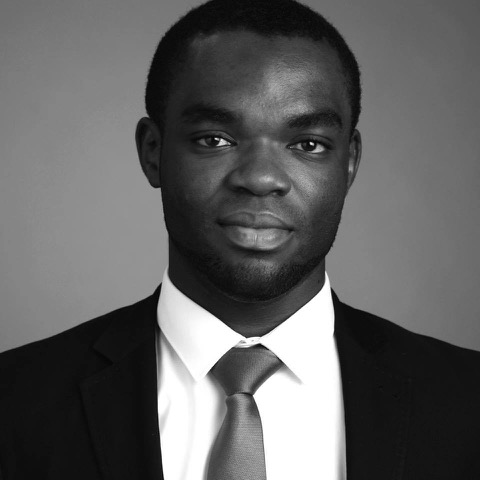


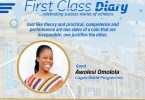
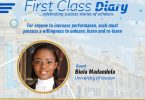
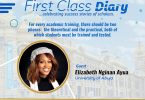
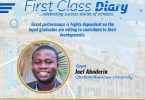
It’s quite interesting how he landed in this stead with a simple fundational drive to challenge his dad’s plot.
Well, overall, I appreciate his stance on mindset when asked for his advice to folks coming behind.
More wins sir!